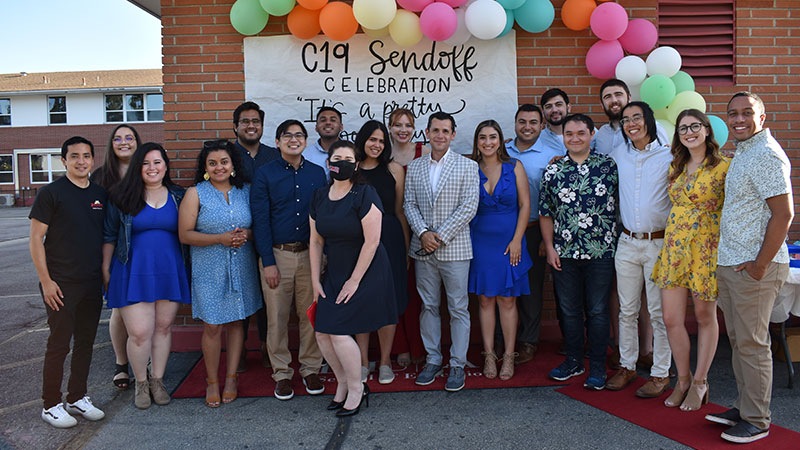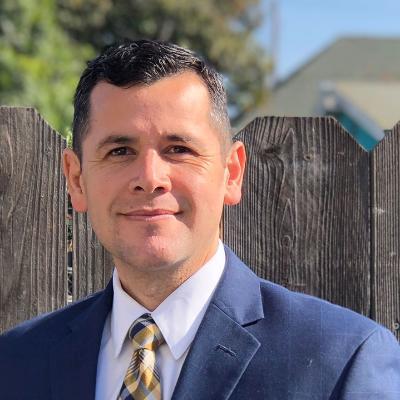
As a second-year teacher at Nativity Catholic School in South Los Angeles, SOE alumnus Antonio Felix M.A. ’07 was part of the second cohort to graduate from LMU School of Education’s Catholic Archdiocesan School Teachers (CAST) program. Today, he serves as director of both that program and its innovative Partners in Los Angeles Catholic Education (PLACE) Corps, which celebrated its 20-year anniversary in 2021.
A longtime partnership with the dioceses of Los Angeles, Orange, and San Bernardino, PLACE Corps brings recent college graduates who are faith- and service-driven into the teaching profession. Candidates are part of a two-year cohort program in which they earn an M.A. in urban education and California preliminary teaching credential, all while living in spiritual community with fellow cohort members and teaching in some of the most under-resourced Catholic schools in the Los Angeles area. To date, PLACE Corps has trained more than 500 educators, who have taught more than 60,000 students at more than 100 partner schools of its diocesan partners.
We spoke with Felix about what sets Catholic education apart and how LMU’s PLACE Corps has cultivated educators who empower their own students to thrive.

Two reports released earlier this year by the National Assessment of Educational Progress found that Catholic school students in grades 4 and 8 are outperforming their public-school peers in math, reading, and science. Why do you think a Catholic school education would contribute to such outcomes?
Teachers are a big part of it. Schools and programs that make significant investments in recruiting and retaining quality teachers achieve the best results, and Catholic schools are doing really well at keeping their teachers.
It also has to do with the freedom Catholic school teachers have to use curricula that work for their school and their student bodies. There's an old saying—"when you’ve seen one Catholic school, you've seen one Catholic school”—which means that these schools must be able to implement practices that best fit the makeup of their populations.
And a third element that can never be ignored is the emphasis that Catholic schools place on a holistic approach to learning and teaching. They recognize that the family unit is the primary educator of children. Learning starts at home, and Catholic schools act as compassionate, faith-filled collaborators in that process.
In what ways is PLACE Corps designed to enhance the ability of Catholic school educators to fulfill their potential?
The program is founded and built upon three pillars: professional development, spiritual growth, and community living. Our candidates—we call them PLACErs—embody these values within their school contexts and in their daily lived experience, which gives them the support that is critical at the beginning of a teacher’s career.
PLACErs also benefit from the academic rigors of the teacher-preparation program at LMU SOE. They teach full-time as they earn their degrees and credentials, and in this way, they're able to consolidate what they learn in coursework, in their own classrooms and schools, and from fellow cohort members to bring best practices to their students quickly.
The supports of the schools they work in and the community they live in are intangible resources that aren't necessarily found in a textbook, or in programs not specifically designed in this manner.
The pandemic forced the closure of most college campuses, but PLACE Corps candidates continued living and studying together. Was this an intentional choice on their part?
Yes. At the onset of the pandemic, our PLACErs were given the opportunity to return home during the distance learning period, but all of them chose to stay in their PLACE community to support each other and their students. One simply said, ”I decided to stay because I wanted to feel closer to my students and their families.” When it was time to return to on-campus teaching, they answered the call to serve with grace and selflessness.
It has been a gift to witness the commitment of our PLACE Corps teachers during the last 19 months. They continued to serve and teach over 3,000 students during this time and are meeting both their learning and their spiritual needs. They are tangible examples of what makes Catholic schools such powerful instruments of change.
What do your alumni go on to do?
At the conclusion of their two-year commitment with PLACE Corps, close to 100 percent of our graduates continue to teach in Catholic schools, and over time, 80 percent continue working in education. Those strong numbers are a testament to their commitment as both educators and Catholics. Many have gone into administration also, becoming and directors in the Department of Catholic Schools (Archdiocesan leadership positions) as well as principals, assistant principals, and other administrative and leadership positions. PLACE Corps has been a robust training ground for a variety of Catholic educators.
Looking forward to the next 20 years, what challenges do you see for Catholic schools and educators, and how do you believe PLACE can fulfill those challenges?
The most immediate challenge facing schools is the teacher shortage being experienced across all educational sectors. Our under-resourced urban Catholic schools are being affected deeply by this reality. PLACE Corps can and will play a role in helping alleviate this challenge. And it will continue to be instrumental in providing faith-centered, dedicated individuals who are committed to serving the church through education and through support of under-resourced communities. I strongly believe that we will always be a PLACE for mission-driven young people who want to make a difference in our world.